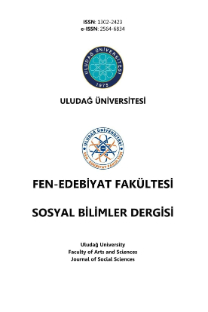CONFLICTUAL APPROACHES to NATIONALISM in THEISLAMIC THOUGHT in THE LATE OTTOMAN SOCIETY: ACASE STUDY of THE JOURNAL SEBILÜR-REŞAD
Geç Osmanlı Toplumu İslami Düşüncesinde Milliyetçiliğe Çatışmalı Yaklaşımlar: Sebilür-reşad Dergisi (1908-19 (1908-1924)
___
- Primary Sources from Sebilü'r-reşad
- Ispartalı Hakkı (1327/1911) "Türklük Gayreti". Sebilür-reşad, C. 6, S. 141, s. 165-166.
- (1334/1918) "Türkçülerin Siyasi Mefkûreleri". Sebilü'r-Reşad, C. 15, S. 375, s. 211.
- (1335/1919) (No title specified). Sebilü'r-Reşad, C. 15, S. 389, s. 441- 442.
- (1335/1919) "Türk Milletine Hür Yaşamak Hakkı Verilmedir". Sebilü'r-Reşad, C. 17, S. 417-418, s. 15.
- (1335/1919) "Türk Ocağındaki Münasebetsizlikler Hakkında". Sebilü'rReşad, C. 18, S. 452, s. 119.
- Eşref Edip (1335/1919). "Türkler ve İslamiyet". Sebilür-reşad, C. 16, S. 408-409, s. 166-168.
- Ömer Rıza (1335/1919a). "Türkçülük, Memleketçilik". Sebilür-reşad, C. 18, S. 448, s. 86-70.
- Ömer Rıza (1335/1919b) "Türk, Kürt, Arap" Sebilü'r-Reşad, C. 17, S. 429-430, s. 111.
- (1336/1920) "Kürtler ve İslamiyet". Sebilü'r-Reşad, C. 18, S. 461, s. 224-225.
- (1336/1920) "Arazi-i Mukaddese Manda Altına Alınamaz". Sebilü'rReşad, C. 18, S. 456, s. 166-167
- (1339/1923) (No title specified). Sebilü'r-Reşad, C. 21, S. 528-529, s. 72.
- Necmeddin Sadık (1340/1924). "Tahripkâr Milliyetperverlik". Sebilü'rReşad, C. 24, S. 605, s. 106-107.
- (1340/1924) (No title specified). Sebilü'r-Reşad, C. 24, S. 605, s. 106- 107. Secondary Sources Ahmad, Feroz (1982). "Unionist Relations with the Greek, Armenian, and Jewish Communities of the Ottoman Empire, 1908-1914".
- Benjamin Braude & Bernard Lewis (ed.) Christians and Jews in the Ottoman Empire: The Functioning of a Plural Society. New York, London: Holmes & Meier Publishers, s. 287-324.
- Akçura, Yusuf (2005). Üç Tarz-ı Siyaset. Ankara: Lotus.
- Anderson, Benedict (2006). Imagined Communities: Reflections on the Origin and Spread of Nationalism. London: Verso.
- Arabacı, Caner (2004). "Eşref Edip Fergan ve Sebilürreşad Üzerine". İslamcılık: Modern Türkiye'de Siyasi Düşünce, C. 6. İstanbul: İletişim Yayınları, s. 96-128.
- Berkes, Niyazi (1998). The Development of Secularism in Turkey. New York: Routledge, 1998.
- Berktay, Halil (2007). "A Genocide, Three Constituencies, Thoughts for the Future (Part I)". Armenian Weekly, C. 73, S. 16.
- Deringil, Selim (1993). "The Invention of Tradition as Public Image in the Late Ottoman Empire, 1808 to 1908". Comparative Studies in Society and History, C. 35, S. 1, s. 3-29.
- ______(1991). "Legitimacy Structures in the Ottoman state: The Reign of Abdülhamit II (1876-1909)". International Journal of Middle East Studies, C. 23, S. 3, s. 345-359.
- Göçek, Fatma Müge (2002a). "Introduction: Narrative, Gender, and Cultural Representation in the Constructions of Nationalism in the Middle East". Fatma Müge Göçek (ed.) Social Constructions of Nationalism in the Middle East. Albany: State University of New York Press, s. 1-14.
- ______(2002b). "Decline of Ottoman Empire and the Emergence of Greek, Armenian, Turkish, and Arab Nationalism". Fatma Müge Göçek (ed.) Social Constructions of Nationalism in the Middle East. Albany: State University of New York Press, s. 15-84.
- Gündüz, Mustafa (2007). II. Meşrutiyet'in Klasik Paradigmaları. İstanbul: Lotus Yayınevi.
- Gülalp, Haldun (1995). "The Crisis of Westernization in Turkey: Islamism versus Nationalism". Innovation: The European Journal of Social Sciences, C. 8, S. 2, s. 175-182.
- Hanioğlu, Şükrü (2002). "Turkish Nationalism and the Young Turks, 1889-1908". Fatma Müge Göçek (ed.) Social Constructions of Nationalism in the Middle East. Albany: State University of New York Press, s. 85-98.
- Kara, İsmail (1985). Tanzimat'tan Cumhuriyete İslamcılık Tartışmaları (Tanzimat'tan Cumhuriyet'e Türkiye Ansiklopedisi), C. 6. İstanbul: İletişim Yayınları.
- Kayalı, Hasan (1997). Arabs and Young Turks: Ottomanism, Arabism, and Islamism in the Ottoman Empire, 1908-1918. Berkeley: University of California Press.
- Keyder, Çağlar (1987). State and Class in Turkey. London, New York: Verso.
- Özdalga, Elisabeth (2006). "The hidden Arab: A Critical Reading of the Notion of 'Turkish Islam'". Middle Eastern Studies, C. 42, S. 4, s. 551- 570.
- Risser, James (1997). Hermeneutics and the Voice of the Other: ReReading Gadamer's Philosophical Hermeneutics. Albany, New York: State University of New York Press.
- Shaw, Stanford and Shaw, Ezel Kural (1977). "History of the Ottoman Empire and Modern Turkey". Reform, Revolution and Republic: The Rise of Modern Turkey, 1808-1975, C. 2. Cambridge: Cambridge University Press.
- Şeker, Nesim (2007). "Demographic Engineering in the Late Ottoman Empire and the Armenians". Middle Eastern Studies, C. 43, S. 3, s. 461-474.
- Ülker, Erol (2005). "Contextualizing 'Turkification': Nation-Building in the Late Ottoman Empire, 1908-1918". Nations and Nationalisms, C. 11, S. 4, s. 613-636.
- Tunaya, Tarık Zafer (1962). İslamcılık Cereyanı: İkinci Meşrutiyetin Siyasi Hayatı Boyunca Gelişmesi ve Bugüne Bıraktığı Meseleler. İstanbul: Baha Matbaası.
- ISSN: 1302-2423
- Yayın Aralığı: 2
- Başlangıç: 1999
- Yayıncı: Bursa Uludağ Üniversitesi
KIBRIS TÜRK MİLLİ MÜCADELESİNDE ERENKÖY DİRENİŞİ: BİR SÖZLÜ TARİH ÇALIŞMASI
Çağatan Taşkın, CEM OKAN TUNCEL
PROGRAMLI MÜZİK: İZLENİMCİ MÜZİKTE DOĞA BETİMLEMELERİ ve C. DEBUSSY'NİN 'SU' TEMALI PİYANO PARÇALARI
İKTİSADİ GELİŞMENİN GÜNDELİK HAYATA ETKİLERİ: DEMOKRAT PARTİ DÖNEMİ İSTANBUL ÖRNEĞİ
PATIENTS and HEALERS in "ZAABALAWI" by NAGUIB MAHFOUZ and A STRANGENESS IN MY MIND by ORHAN PAMUK
BEETHOVEN'IN SON DÖNEM ÜSLUBU, SON PİYANO SONATLARI ve "OP. 106, HAMMERKLAVİER"
I. CONSTANTINUS'UN HRİSTİYANLIĞI MESELESİ ve ÖLÜMÜ HAKKINDAKİ TARTIŞMALAR
I. CONSTANTINUS'UN HRİSTİYANLIĞI MESELESİ ve ÖLÜMÜ HAKKINDAKİ TARTIŞMALAR
